选择疑问句句型归纳
六年级句型知识点归纳

六年级句型知识点归纳一、陈述句句型1. 主语+谓语动词例如:我喜欢读书。
2. 主语+be动词+表语例如:她是个好学生。
3. 主语+动词+宾语例如:我看见了一只小猫。
4. 主语+动词+间接宾语+直接宾语例如:妈妈给我买了一本故事书。
5. 主语+动词+宾语+宾语补足语例如:他们选我当班长。
6. 主语+情态动词+动词原形例如:你可以去玩。
7. 主语+助动词+动词过去分词例如:我被老师批评了。
8. 主语+be动词+现在分词例如:她正在看电视。
二、疑问句句型1. Yes/No疑问句:把句子的陈述形式改为疑问句,肯定回答用"Yes",否定回答用"No"。
例如:你是学生吗?2. 选择疑问句:在句子中提出两个或多个选择,让对方选择其中一个。
例如:你想要苹果还是香蕉?3. 特殊疑问句:对句子中的某个成分进行提问,使用特殊疑问词。
例如:你从哪里来?4. 一般疑问句:对句子的陈述形式进行提问而不改变句子中的词语顺序,通常用于询问事实。
例如:你喜欢篮球吗?三、祈使句句型1. 动词原形开头的祈使句例如:保持安静。
2. don't + 动词原形的祈使句例如:不要迟到。
四、感叹句句型1. What + 名词 + 主语 + 谓语例如:天气多好啊!2. How + 形容词/副词 + 主语 + 谓语例如:多么聪明的孩子啊!五、否定句句型1. 主谓倒装句型例如:I can't swim. → Can't I swim?2. 否定副词放在句首句型例如:He never plays football.3. 否定词+be动词+表语例如:这不是我的书。
六、比较句句型1. as + 形容词/副词原级 + as例如:Tom is as tall as Jack.2. 主语+be动词+形容词比较级+than+宾语例如:This book is more interesting than that one.七、复合句句型1. 宾语从句例如:我知道你想要什么。
英语选择疑问句的基本结构
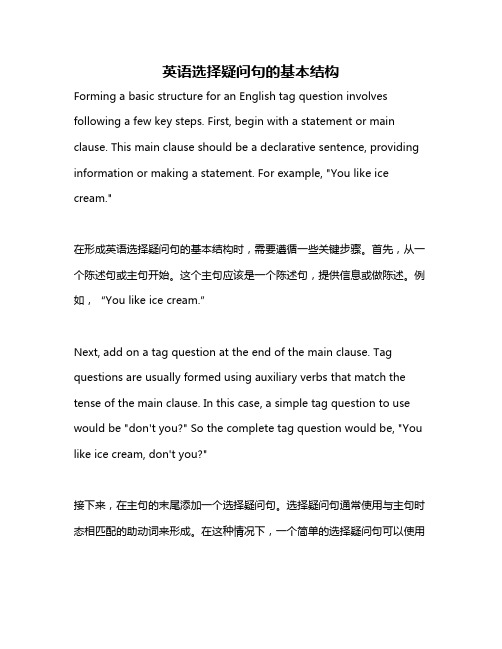
英语选择疑问句的基本结构Forming a basic structure for an English tag question involves following a few key steps. First, begin with a statement or main clause. This main clause should be a declarative sentence, providing information or making a statement. For example, "You like ice cream."在形成英语选择疑问句的基本结构时,需要遵循一些关键步骤。
首先,从一个陈述句或主句开始。
这个主句应该是一个陈述句,提供信息或做陈述。
例如,“You like ice cream.”Next, add on a tag question at the end of the main clause. Tag questions are usually formed using auxiliary verbs that match the tense of the main clause. In this case, a simple tag question to use would be "don't you?" So the complete tag question would be, "You like ice cream, don't you?"接下来,在主句的末尾添加一个选择疑问句。
选择疑问句通常使用与主句时态相匹配的助动词来形成。
在这种情况下,一个简单的选择疑问句可以使用的是“don't you?” 因此,完整的选择疑问句应该是,“You like ice cream, don't you?”It's important to note that tag questions are used to seek confirmation or agreement from the listener. This means that the speaker already assumes the information in the main clause to be true and is looking for the listener to confirm it. Tag questions are also used to soften the tone of a statement, making it less assertive and more inviting for a response.需要注意的是,选择疑问句用于从听者那里寻求确认或同意。
英语语法-句型(疑问句)
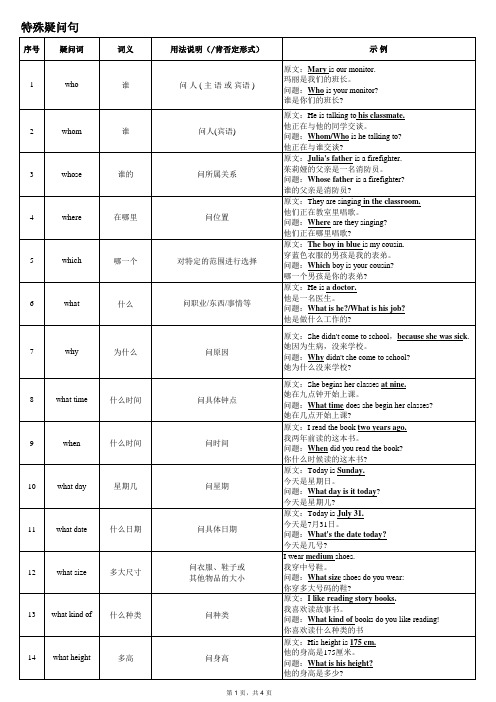
第 2 页,共 4 页
序号 疑问词
词义
用法说明(/肯否定形式)
示例
25 how often
多久一次
问频率
原文:He goes jogging twice a week. 他每周慢跑两次。 问题:How often does he go jogging? 他多久慢跑一次?
26 how many times 多少次
What do you think of/about......? 31 How do you like......? 你认为......怎么样? 对对方观点(评价)提问
含有情态动词的一般疑问句
序号 1
原形 can
含义
①能;会 ②可以
肯定式/否定式 (及缩写形式)
【肯】can do 【否】can not/cannot/can't do
特殊疑问句
序号 疑问词
词义
1
who
谁
2
whom
谁
3
whose
谁的
4
where
在哪里
5
which
哪一个
6
what
什么
7
why
为什么
8
what time
什么时间
9
when
什么时间
10
what day
四年级句型知识点总结归纳
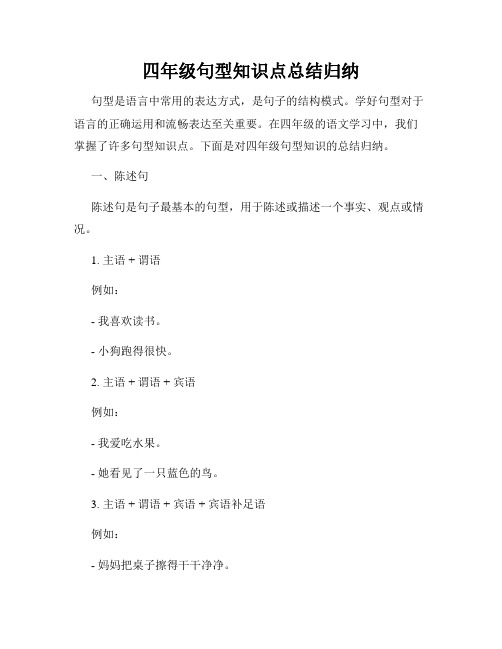
四年级句型知识点总结归纳句型是语言中常用的表达方式,是句子的结构模式。
学好句型对于语言的正确运用和流畅表达至关重要。
在四年级的语文学习中,我们掌握了许多句型知识点。
下面是对四年级句型知识的总结归纳。
一、陈述句陈述句是句子最基本的句型,用于陈述或描述一个事实、观点或情况。
1. 主语 + 谓语例如:- 我喜欢读书。
- 小狗跑得很快。
2. 主语 + 谓语 + 宾语例如:- 我爱吃水果。
- 她看见了一只蓝色的鸟。
3. 主语 + 谓语 + 宾语 + 宾语补足语例如:- 妈妈把桌子擦得干干净净。
- 那个花园种满了鲜花。
二、疑问句疑问句用于提问,询问信息或事实。
1. 一般疑问句(以助动词或系动词开头)例如:- 你喜欢吃苹果吗?- 他是一位老师吗?2. 特殊疑问句(用疑问代词或疑问副词引导)例如:- 你在哪里出生?- 今天是星期几?三、祈使句祈使句用于表达请求、命令、建议等。
1. 动词开头例如:- 别忘记交作业。
- 给我一杯水。
2. 动词不开头例如:- 请帮我一个忙。
- 善待小动物。
四、感叹句感叹句用于表达强烈的情感或者感叹、赞美等。
1. 以感叹代词或疑问代词引导例如:- 多么漂亮的花啊!- 我怎么会忘记这个问题呢?2. 带有感叹词语气词或修饰语例如:- 真是令人惊喜的消息!- 多么棒的表演啊!五、倒装句倒装句是将谓语动词的全部或部分移到主语之前的句子。
常用于强调句首的内容。
1. 完全倒装(助动词、系动词或情态动词+主语+谓语)例如:- Can you swim?(你会游泳吗?)- Here comes the train.(火车来了。
)2. 部分倒装(副词、介词短语或状语置于句首)例如:- In the classroom sat a small boy.(教室里坐着一个小男孩。
)- Never have I seen such a beautiful sunset.(我从未见过如此美丽的日落。
)六、条件句条件句用于表示假设、条件等。
英语语法之疑问句
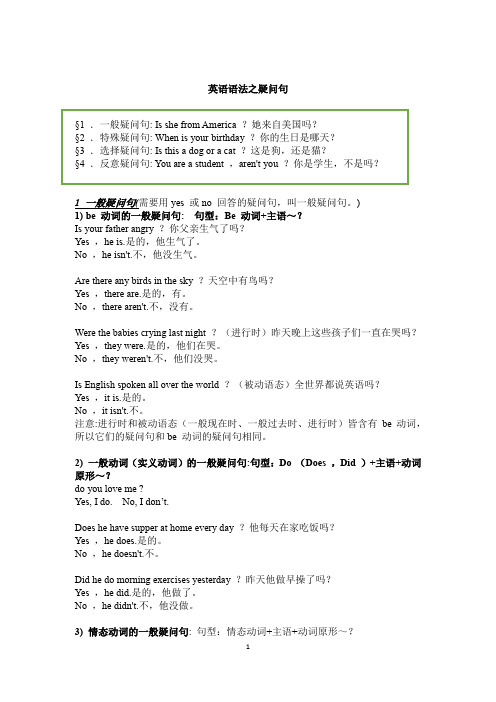
英语语法之疑问句§1 .一般疑问句: Is she from America ?她来自美国吗?§2 .特殊疑问句: When is your birthday ?你的生日是哪天?§3 .选择疑问句: Is this a dog or a cat ?这是狗,还是猫?§4 .反意疑问句: You are a student ,aren't you ?你是学生,不是吗?1 一般疑问句(需要用yes 或no 回答的疑问句,叫一般疑问句。
)1) be 动词的一般疑问句: 句型:Be 动词+主语~?Is your father angry ?你父亲生气了吗?Yes ,he is.是的,他生气了。
No ,he isn't.不,他没生气。
Are there any birds in the sky ?天空中有鸟吗?Yes ,there are.是的,有。
No ,there aren't.不,没有。
Were the babies crying last night ?(进行时)昨天晚上这些孩子们一直在哭吗?Yes ,they were.是的,他们在哭。
No ,they weren't.不,他们没哭。
Is English spoken all over the world ?(被动语态)全世界都说英语吗?Yes ,it is.是的。
No ,it isn't.不。
注意:进行时和被动语态(一般现在时、一般过去时、进行时)皆含有be动词,所以它们的疑问句和be 动词的疑问句相同。
2) 一般动词(实义动词)的一般疑问句:句型:Do (Does ,Did )+主语+动词原形~?do you love me ?Yes, I do. No, I don’t.Does he have supper at home every day ?他每天在家吃饭吗?Yes ,he does.是的。
2021小升初英语总复习 第三部分 句型巩固 第二节 疑问句

Mike is 158 cm tall.→How tall is Mike? 迈克身高158厘米。→ 迈克有多高? I'm 51 kg.→How heavy are you? 我体重51千克。→你有多重? (14)how often:用于对时间频率提问。如: I water the flowers once a day.→How often do you water the flowers?我每天浇花一次。→你多久浇一次花?
2. 将陈述句改为一般疑问句的方法 (1) 当句中含有be动词、情态动词时,只要把这些词提前至句 首,再将句号改为问号即可。如: He is from England.→Is he from England? 他来自英国。→他是 来自英国吗?
They are working hard.→Are they working hard? 他们很努力工 作。→他们努力工作吗? Mike and John can do kung fu.→Can Mike and John do kung fu? 迈克和约翰会打功夫。→迈克和约翰会打功夫吗?
返回目录
(4)why:用于对事情的原因提问。如: I go to work by subway, because it is fast.→Why do you go to work by subway?我坐地铁去上班,因为它很快。→你为什 么坐地铁去上班?
(5)how:用于对方式或程度等提问。如: I go to school on foot.→How do you go to school? 我走路去上 学。→你怎么样去上学? (6)which:用于对名词前的修饰词提问,而且必须和名词连用。 如: I want the big backpack.→Which backpack do you want?我想要 这个大的背包。→你想要哪一个背包?
英语常用句型--疑问句
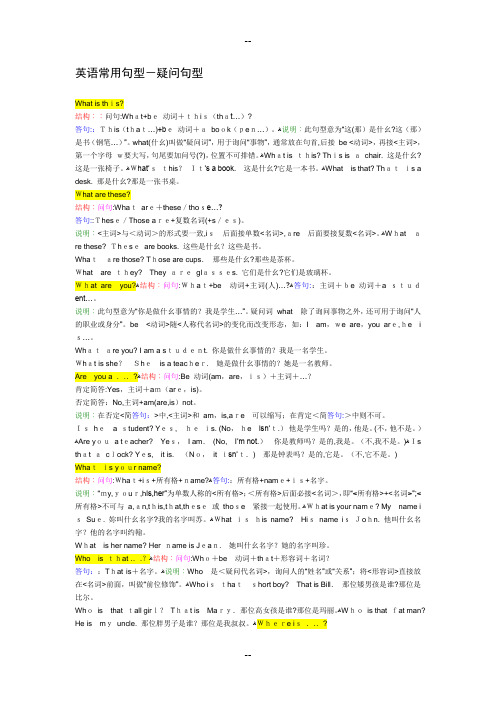
英语常用句型-疑问句型What is this?结构︰︰问句:What+be动词+this(that…)?答句::This(that…)+be动词+abook(pen…)。
ﻫ说明︰此句型意为“这(那)是什幺?这(那)是书(钢笔…)”。
what(什幺)叫做“疑问词”,用于询问“事物”,通常放在句首,后接be <动词>,再接<主词>,第一个字母w要大写,句尾要加问号(?),位置不可排错。
ﻫWhat is this? This is achair. 这是什幺?这是一张椅子。
ﻫWhat’sthis?It’s a book.这是什幺?它是一本书。
ﻫWhat is that? Thatis a desk. 那是什幺?那是一张书桌。
What are these?结构︰问句:Whatare+these/those…?答句::These/Those are+复数名词(+s/es)。
说明︰<主词>与<动词>的形式要一致,is后面接单数<名词>,are后面要接复数<名词>。
ﻫWhatare these? Theseare books. 这些是什幺?这些是书。
Whatare those? Those are cups.那些是什幺?那些是茶杯。
What are they?They areglasses. 它们是什幺?它们是玻璃杯。
What are you?ﻫ结构︰问句:What+be动词+主词(人)…?ﻫ答句::主词+be 动词+a student…。
说明︰此句型意为“你是做什幺事情的?我是学生…”。
疑问词what除了询问事物之外,还可用于询问“人的职业或身分”。
be<动词>随<人称代名词>的变化而改变形态,如:I am,we are,you are,he i s…。
Whatare you? I am a student. 你是做什幺事情的?我是一名学生。
疑问句句型详解

疑问句句型详解(一) 一般疑问句一、一般疑问句的基本用法及结构一般疑问句用于对某一情况提出疑问,通常可用yes和no来回答。
其基本结构是“be / have / 助动词+主语+谓语(表语)”Is he interested in going? 他有兴趣去吗?Have you ever been to Japan? 你到过日本吗?Does she often have colds? 她常常感冒吗?Did you ask her which to buy? 你问没问她该买哪一个?二、陈述句变一般疑问句的方法1. 动词be的疑问式:动词be根据不同的时态和人称可以有am, is, are, was, were等不同形式,可用作连系动词(表示“是”、“在”等)和助动词(用于构成进行时态和被动语态等),但不管何种情况,构成疑问式时,一律将动词be的适当形式置于句首:我是对的吗?_______________________________你今天感到好些了吗?_______________________________他上学迟到了吗?_______________________________2. 动词have的疑问式:动词have根据不同的时态和人称可以有have, has, had等形式,可以用作实意动词和助动词,分以下情况讨论:①用作实意动词表示状态,如表示拥有、患病或用于have to表示“必须”等,可根据情况在句首使用do, does, did:他有朋友吗?_______________________________②用作实意动词表示动作,如表示“吃(=eat)”、“喝(=drink)”、“拿(=take)”、“收到(=receive)”、“度过(=spend)”等,构成疑问式时不能将have提前至句首,而应在句首使用do, does, did:他在家吃早餐吗?_______________________________你在晚会上玩得高兴吗?_______________________________③用作助动词构成完成时态,其疑问式总是将have等置于句首:你的工作做完了吗?_______________________________他已经离开了吗?_______________________________3. 情态动词的疑问式:通常是将情态动词置于句首你会说英语吗?_______________________________Must I finish the work at once? _______________________________4. 实意动词的疑问式:一般实意动词的疑问式,通常应根据不同时态和人称在句首加助动词do, does, did等:你每天都上学吗?_______________________________这男孩喜欢唱歌吗?_______________________________你昨晚看了这部电影吗?_______________________________一般疑问句一般读升调。
疑问句的句型
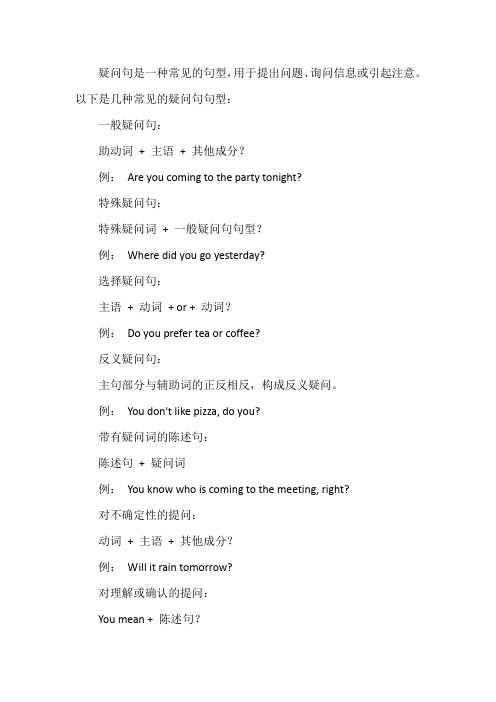
疑问句是一种常见的句型,用于提出问题、询问信息或引起注意。
以下是几种常见的疑问句句型:
一般疑问句:
助动词+ 主语+ 其他成分?
例:Are you coming to the party tonight?
特殊疑问句:
特殊疑问词+ 一般疑问句句型?
例:Where did you go yesterday?
选择疑问句:
主语+ 动词+ or + 动词?
例:Do you prefer tea or coffee?
反义疑问句:
主句部分与辅助词的正反相反,构成反义疑问。
例:You don't like pizza, do you?
带有疑问词的陈述句:
陈述句+ 疑问词
例:You know who is coming to the meeting, right?
对不确定性的提问:
动词+ 主语+ 其他成分?
例:Will it rain tomorrow?
对理解或确认的提问:
You mean + 陈述句?
例:You mean we need to be there by 9 AM?
询问方式或方法:
How + 动词/形容词+ 主语?
例:How does she study for exams?
这些疑问句句型可以根据需要进行灵活运用,使语言更加生动有趣,同时也更准确地表达出提问者的意图。
【题型解读与技巧点拨 中考英语】专题10 任务型阅读(解析版)
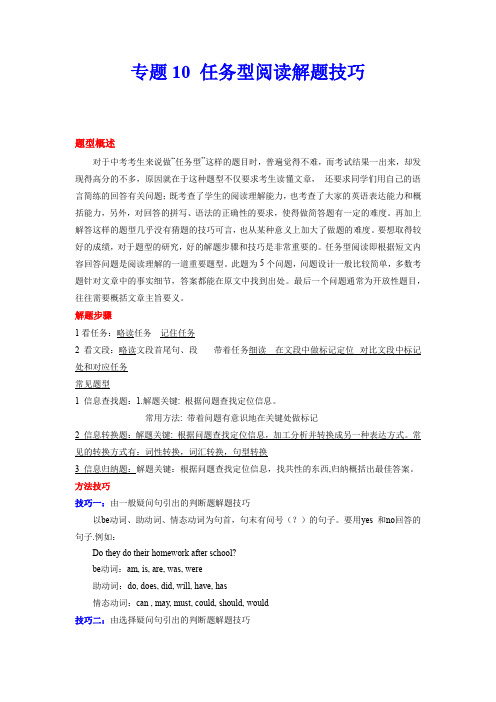
专题10 任务型阅读解题技巧题型概述对于中考考生来说做“任务型”这样的题目时,普遍觉得不难,而考试结果一出来,却发现得高分的不多,原因就在于这种题型不仅要求考生读懂文章,还要求同学们用自己的语言简练的回答有关问题;既考查了学生的阅读理解能力,也考查了大家的英语表达能力和概括能力,另外,对回答的拼写、语法的正确性的要求,使得做简答题有一定的难度。
再加上解答这样的题型几乎没有猜题的技巧可言,也从某种意义上加大了做题的难度。
要想取得较好的成绩,对于题型的研究,好的解题步骤和技巧是非常重要的。
任务型阅读即根据短文内容回答问题是阅读理解的一道重要题型。
此题为5个问题,问题设计一般比较简单,多数考题针对文章中的事实细节,答案都能在原文中找到出处。
最后一个问题通常为开放性题目,往往需要概括文章主旨要义。
解题步骤1看任务:略读任务记住任务2看文段:略读文段首尾句、段----带着任务细读---在文段中做标记定位--对比文段中标记处和对应任务常见题型1 信息查找题:1.解题关键: 根据问题查找定位信息。
常用方法: 带着问题有意识地在关键处做标记2 信息转换题:解题关键: 根据问题查找定位信息,加工分析并转换成另一种表达方式。
常见的转换方式有:词性转换,词汇转换,句型转换3 信息归纳题:解题关键:根据问题查找定位信息,找共性的东西,归纳概括出最佳答案。
方法技巧技巧一:由一般疑问句引出的判断题解题技巧以be动词、助动词、情态动词为句首,句末有问号(?)的句子。
要用yes 和no回答的句子.例如:Do they do their homework after school?be动词:am, is, are, was, were助动词:do, does, did, will, have, has情态动词:can , may, must, could, should, would技巧二:由选择疑问句引出的判断题解题技巧提出两种或两种以上的情况,要求选择一种情况回答,这种问句叫做选择疑问句,选择疑问句的两种或两种以上的情况用or连接,回答时不能用yes或no。
小学英语疑问句总结

小学英语疑问句总结篇一:小学英语特殊疑问句和一般疑问句的归纳特殊疑问句和一般疑问句的答法一般疑问句通常都是 1..以be 开头2.以Do,Does,Did 开头或以Can 开头回答方法:前面用什么提问的就用什么答。
只有两种回答方式:1)肯定的, Yes,主语 + 提问词.2)否定的No,主语+提问词+not. 【注意:问句与答句的第一二人称要互换】如:④主语是名字时的答语:看性别,男的用he ,女的用she ,其他的用it 复数就用they。
如:① Is she…… Is he………Is it……..Yes, she is. Yes, he , it , she isn,, he isn,t. No, it isn,t. ②Are they………?Are the monkeys …….Yes, they are. Yes, they are. No,they aren’tNo,they aren’t③Do they.........?Does he.. (i)she…….Yes,they do. Yes,he , she did. No,they don’,he doesn’t. No,she didn’t. ④ Are you…….. Are you…….. Do you…….Yes, I , we ,I do. 或 Yes, No, I am not. No, wearen’t. No,I don’t. 或No,⑤ Does Mike…….Is ChenJi…..Do your parents…Yes ,he does. Yes , she , they do. No,he doesn’t. No, she isn’,they don’t.一、专项练习。
11. Did ChenJie read books yesterdaythe girl cook the meals ?—————————————————————————————he going to swim this afternoon4. Are they going to take a trip next weend————————————————————————————————5.Does he often go to school by bike 6. Do you play basketball every weekend———————————————————————————————————7. Did Mike do his homework yesterday?8. Are they playing basketball now————————————————————————————————一般疑问句及特殊疑问句的总结一般疑问句的定义:用yes或no来回答的疑问句叫一般疑问句。
选择疑问句
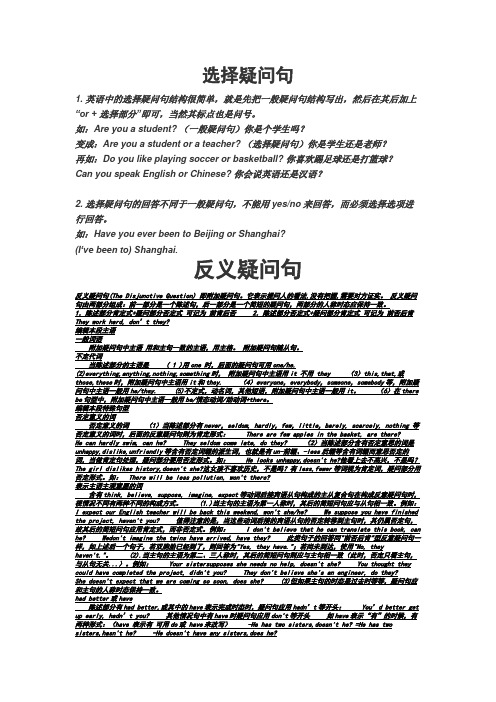
选择疑问句1. 英语中的选择疑问句结构很简单,就是先把一般疑问句结构写出,然后在其后加上“or + 选择部分”即可,当然其标点也是问号。
如:Are you a student? (一般疑问句)你是个学生吗?变成:Are you a student or a teacher? (选择疑问句)你是学生还是老师?再如:Do you like playing soccer or basketball? 你喜欢踢足球还是打篮球?Can you speak English or Chinese? 你会说英语还是汉语?2. 选择疑问句的回答不同于一般疑问句,不能用yes/no来回答,而必须选择选项进行回答。
如:Have you ever been to Beijing or Shanghai?(I‘ve been to) Shanghai.反义疑问句反义疑问句(The Disjunctive Question) 即附加疑问句。
它表示提问人的看法,没有把握,需要对方证实。
反义疑问句由两部分组成:前一部分是一个陈述句,后一部分是一个简短的疑问句,两部分的人称时态应保持一致。
1.陈述部分肯定式+疑问部分否定式可记为前肯后否2.陈述部分否定式+疑问部分肯定式可记为前否后肯They work hard, don’t they?编辑本段主语一般词语附加疑问句中主语用和主句一致的主语,用主格。
附加疑问句随从句。
不定代词当陈述部分的主语是( 1 )用one 时,后面的疑问句可用one/he.(2)everything,anything,nothing,something时,附加疑问句中主语用it 不用 they (3)this,that,或those,these时,附加疑问句中主语用it和they. (4)everyone,everybody,someone,somebody等,附加疑问句中主语一般用he/they. (5)不定式,动名词,其他短语,附加疑问句中主语一般用it。
疑问句英语的句型结构
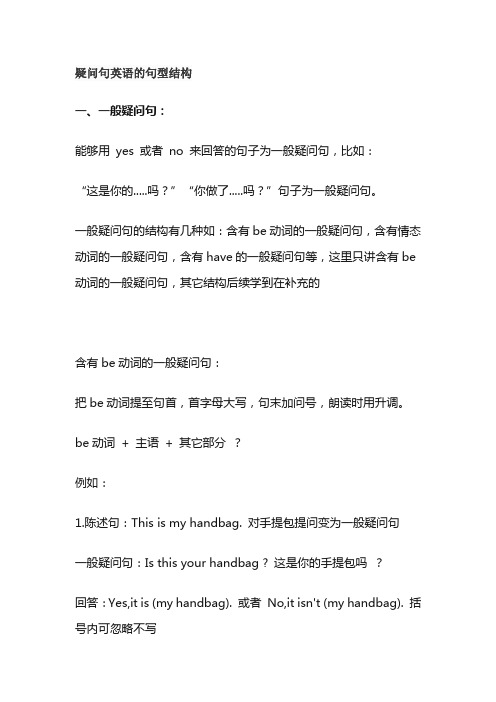
疑问句英语的句型结构一、一般疑问句:能够用yes 或者no 来回答的句子为一般疑问句,比如:“这是你的.....吗?”“你做了.....吗?”句子为一般疑问句。
一般疑问句的结构有几种如:含有be动词的一般疑问句,含有情态动词的一般疑问句,含有have的一般疑问句等,这里只讲含有be 动词的一般疑问句,其它结构后续学到在补充的含有be动词的一般疑问句:把be动词提至句首,首字母大写,句末加问号,朗读时用升调。
be动词+ 主语+ 其它部分?例如:1.陈述句:This is my handbag. 对手提包提问变为一般疑问句一般疑问句:Is this your handbag ? 这是你的手提包吗?回答:Yes,it is (my handbag). 或者No,it isn't (my handbag). 括号内可忽略不写2.陈述句:This is my pen. 对钢笔进行提问一般疑问句:Is this your pen ? 这是你的钢笔吗?回答:Yes,it is. 或No,it isn't.3.陈述句:They are in the classroom.一般疑问句:Are they in the classroom ?回答:Yes,they are. 或No, they aren't.三、选择疑问句一般提出两种或两种以上的可能,让对方从中作出选择的疑问句,选项之间要用连词or 连接,or 前读升调,后面选项读降调例如:1.Are you a doctor or a nurse ? 你是一位医生还是护士?(选择疑问句)回答:I'm a doctor. 或I'm not a nurse.2.Are you Chinese or English? 你是中国人还是英国人?回到:I'm Chinese. I'm not English.3. Is this your house or his house? 这是你的房子还是他的房子?回答:This is my house. 或This isn't his house.四、特殊疑问句英语中特殊疑问词引导(做开头)的问句称为特殊疑问句,读时用降调。
2024年初中英语语法专项复习归纳之选择疑问句与特殊疑问句
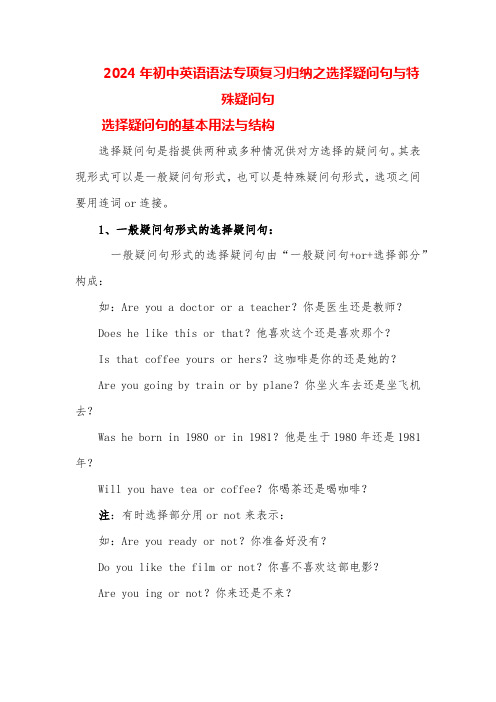
2024年初中英语语法专项复习归纳之选择疑问句与特殊疑问句选择疑问句的基本用法与结构选择疑问句是指提供两种或多种情况供对方选择的疑问句。
其表现形式可以是一般疑问句形式,也可以是特殊疑问句形式,选项之间要用连词or连接。
1、一般疑问句形式的选择疑问句:一般疑问句形式的选择疑问句由“一般疑问句+or+选择部分”构成:如:Are you a doctor or a teacher?你是医生还是教师?Does he like this or that?他喜欢这个还是喜欢那个?Is that coffee yours or hers?这咖啡是你的还是她的?Are you going by train or by plane?你坐火车去还是坐飞机去?Was he born in 1980 or in 1981?他是生于1980年还是1981年?Will you have tea or coffee?你喝茶还是喝咖啡?注:有时选择部分用or not来表示:如:Are you ready or not?你准备好没有?Do you like the film or not?你喜不喜欢这部电影?Are you ing or not?你来还是不来?2、特殊疑问句形式的选择疑问句:特殊疑问句形式的选择疑问句由“特殊疑问句,选项A+or+选项B”:如:Which would you like, tea or coffee?你想要哪样,是茶还是咖啡?Who runs faster, you or Tom?你和汤姆谁跑得快一点?When shall we leave, today or tomorrow?我们什么时候离开,今天还是明天?How long did he live there, five years or ten years?他在那儿住了多久,是5年还是10年?How shall we go, on foot or by bus?我们怎么去,走路去还是坐公共汽车去?选择疑问句的概念:选择疑问句是说话者对问题提出两个或两个以上的答案,供对方选择其一。
初中英语疑问句句型分类知识点讲解
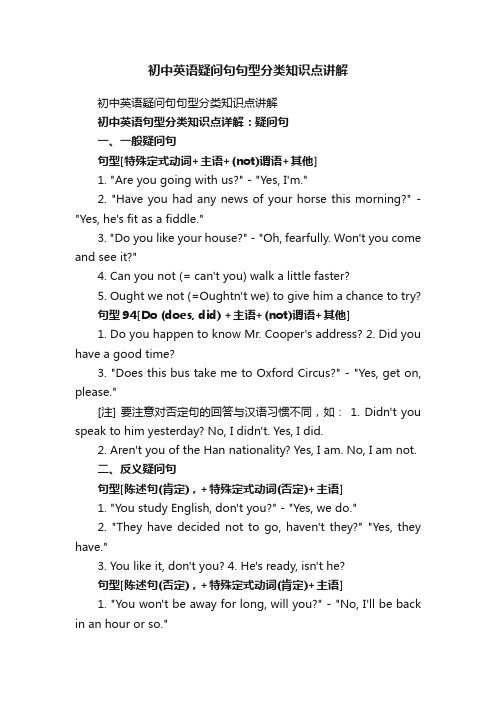
初中英语疑问句句型分类知识点讲解初中英语疑问句句型分类知识点讲解初中英语句型分类知识点详解:疑问句一、一般疑问句句型[特殊定式动词+主语+(not)谓语+其他]1. "Are you going with us?" - "Yes, I'm."2. "Have you had any news of your horse this morning?" - "Yes, he's fit as a fiddle."3. "Do you like your house?" - "Oh, fearfully. Won't you come and see it?"4. Can you not (= can't you) walk a little faster?5. Ought we not (=Oughtn't we) to give him a chance to try?句型94[Do (does, did) +主语+(not)谓语+其他]1. Do you happen to know Mr. Cooper's address?2. Did you have a good time?3. "Does this bus take me to Oxford Circus?" - "Yes, get on, please."[注] 要注意对否定句的回答与汉语习惯不同,如: 1. Didn't you speak to him yesterday? No, I didn't. Yes, I did.2. Aren't you of the Han nationality? Yes, I am. No, I am not.二、反义疑问句句型[陈述句(肯定),+特殊定式动词(否定)+主语]1. "You study English, don't you?" - "Yes, we do."2. "They have decided not to go, haven't they?" "Yes, they have."3. You like it, don't you?4. He's ready, isn't he?句型[陈述句(否定),+特殊定式动词(肯定)+主语]1. "You won't be away for long, will you?" - "No, I'll be back in an hour or so."2. "… I think I'll go into the green line. You couldn't give mea helping hand, could you, Mr. Snape?"3. "I'd like to go to Central Australia with you…. you h ave never been out of England, have you?"4. "He doesn't know anything about it, does he?" - "No, he doesn't.三、特指疑问句句型[疑问词(主语)+系词+表语]/ [疑问词(定语)+主语+行为动词+宾语]1. Who is there?2. Who gives your English lessons?3. What is in the box?4. Which is mine?5. Whose book is on the desk?6. How many students work in the workshop?7. What new products have been turned out in that factory?句型疑问词(表语/宾语/状语)+特殊定式动词+主语+行为动词…]1. Who is he?2. What is he?3. What is he like?4. What is it like?5. What kind of man is he?6. What day is today?7. What's the date today?8. What time is it now?9. How do you do?10. How are you getting along? (= how goes it with you? = how is life? = how is everything with you?11. How is your health? 12. How do you feel? 13. What's matter with you?14. Where are you going? 15. Where do you come from? 16. Where are you from?17. What's your nationality, please? 18. What family are you from?句型[疑问词+in the world/on earth/the devil/the deuce/ever等强调词语+其他]1. "What the deuce shall I write about?" - He thought.2. Whatin the world do you mean?3. Who on earth (in the world) told you that?4. Who the devil is he?5. What the deuce is the matter?6. What the dickens is it?7. Who ever wants this?四、选择疑问句句型[一般疑问句+or+一般疑问句]1. Shall we come to see you or will you come to see us?2. Are you from the South or from the North?3. Will he go on Monday or on Tuesday?4. Did you speak to them, or did the manager?5. Where's the bank? Should I go this way or that way?句型[特指疑问句,+A or B ?]1. "What would you like, Chinese or European food?" - "I don't mind one way or the other."2. Which would you rather have - steak or fish?3. Who will be your teacher, Mr. Brown or Mr. Cooper?4. Where did you spend your leave: in Shanghai or in Hangzhou?5. When will he go there, tomorrow or some other day?五、间接疑问句句型[适当的主语+疑问关联词+从句(正常语序)]1. I'd like to know how old you are.2. He inquired how it was done.3. "Guess how old I am." - "I'd say you're about twenty-three."4. I ask you what you want.5. Please advise me which book I should read first.6. Tell me why it is so important.句型[适当的`主语+if/whether+从句(正常语序)]1. I sometimes ask myself the question whether it was worththe effort.2. I ask you whether it is true or not.3. She asked if I had slept.4. Tell me whether you like it.5. He visited us next day and asked if we had got home safe.6. She inquired if he liked the post.六、双重疑问句句型一般疑问句+疑问关联词+从句(正常语序)]1. Can you tell me where he has gone?2. Have you any idea where he lives?3. May I ask you then what you would advise me to do?4. Do you know who lives here?5. Do you know when he was born?句型[疑问词+do you think/did you say/can you guess/do you suppose+其他(正常语序)]1. What will be the result, do you think?2. "How old were you then, Clyde, did you say?" "Between seventeen and eighteen."3. When do you think the meeting will be held?4. How many books, can you guess, did he buy the other day?5. What do you suppose he's hanging around here?七、修辞疑问句句型[陈述句(肯定)+反问句(肯定)]1. We're old friends, not strangers, right?2. So you've been abroad, have you?3. She's a sweet little girl, is she?4. The land reform has just reached the stage of deciding everyone's class status, so you come sucking around, do you?句型[疑问词+should+主语+动词原形+其他]1. Who should I see but my own brother?2. Who should there be?3. Why should the door be locked?4. Who/Whom should I see in the courtyard but Mr. Smith?5. "Where is Jane?" - "How should I know?"6. Why should he be angry with me?句型[Oh,/So+陈述句+反问句]1. Oh, he's here now, is he?2. Oh, you told him all about it, did you?3. So you've the luggage taken to the station, have you?4. So you're going abroad, are you?八、回响疑问句句型[A:陈述句+B:疑问句(重复A句中的部分)]1. A: I didn't like that meal. B: You didn't like it? (怀疑)2. "I'm tired." - "Are you?" (怀疑)3. A: The Browns are emigrating. B: Emigrating? (惊讶)4. A: It cost sixty dollars. B: How much did it cost? (惊讶)5. A: Switch the light off, please. B: Switch the light off, you say? / Switch what off? (反对)句型[A: 疑问句+B: 重述性疑问句]1. A: What do you think of the picture? B: What do I think of it? (怀疑)2. A: How did you enjoy the carnival? B: How did I enjoy what? (要求)3. A: How did you enjoy your holidays? B: How did I enjoy my holidays? (考虑回答)4. A: Have you borrowed my pen? B: (Have I) Borrowed your pen? (反驳)九、陈述式疑问句句型[任何陈述形式的疑问句(词序不变)]1. My friend's here?2. You wouldn't see me left here alone?3. "You followed us, then?" - "What's that to you? ..." saidJones, "Go to the devil!"4. A two million dollar building, you can't touch the walls?5. "You are not ill?" was the question put, "A little sick," replied Miss Keldar.句型[…疑问词(在剧中任何位置上)]1. "You use that position as a favorite to insult a gentleman." - "To insult a what?" said Steerforth.2. Five times what number makes twenty?3. I asked the carrier, "Are we going all the way there?" - "All the way where?" asked the carrier4. You're twenty-what (odd) this year?5. He's your who?6. Your who is a steel-worker?7. How old a child could draw this? 8. He is your son of what number?。
英语语法-疑问句

并列分句结构中反意疑问句的运用
当陈述句是由并列连接词and, but, or, for, so等连接的两个并列分句组成时,反意疑问句部分一般与最接近的分句保持一致,也就是说,对后一分句进行反问。 He was a lazy child, and he didn’t pass the exam, did he? 他是一个偷懒的孩子,他没能通过考试,是吗?
have用作实义动词时,反意疑问句部分只可用do(not)的相应形式。
例 We have to start early, don’t we? 我们必须早点出发,是吗?
当陈述部分有hardly, scarcely, barely, rarely, seldom, few, little, no, never, nothing, nobody, nowhere等否定词或半否定词时,反意疑问句部分要用肯定形式。
02
注 当think等这些动词的主语不是第一人称,或主语是第一人称,而动词时态不是一般现在时或一般过去时,这时,反意疑问句的助动词和人称代词要与主句保持一致。
例 Mary thinks you will come to the party, doesn’t she? 玛丽认为你将来参加晚会,是吗?
02
You are a student ,aren’t you ?
03
三、反意疑问句
(一)、简单句式结构中反意疑问句的运用 反意疑问句运用于简单句式结构中时,我们应注意掌握以下几个方面 当陈述句部分的主语是名词时,反意疑问句的主语必须用人称代词来代替。 Your brother has gone to the library, hasn’t he? 你弟弟去图书馆了,是吗?
当陈述部分是everyone / everybody, someone / somebody, no one / nobody, none等表示人的不定代词时,反意疑问句部分的主语多用they,但也可用he;当陈述部分的主语是everything, anything, something, nothing等表示物的不定代词时,反意疑问句部分分提问,则语序为倒装语序,结构为:疑问词+一般疑问句语序? 如: I am from china. -------Where are you from? He looks like a monkey .-------What does he look like? I am in class one .------which class are you in? He gets up at six every morning.-----What time does he get up every morning? I know the news by TV.-----How do you know the news?
英语语法疑问句知识点集锦
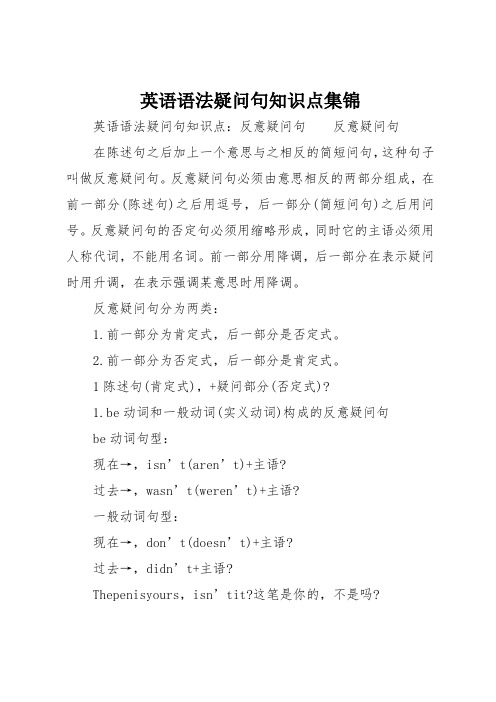
英语语法疑问句知识点集锦英语语法疑问句知识点:反意疑问句反意疑问句在陈述句之后加上一个意思与之相反的简短问句,这种句子叫做反意疑问句。
反意疑问句必须由意思相反的两部分组成,在前一部分(陈述句)之后用逗号,后一部分(简短问句)之后用问号。
反意疑问句的否定句必须用缩略形成,同时它的主语必须用人称代词,不能用名词。
前一部分用降调,后一部分在表示疑问时用升调,在表示强调某意思时用降调。
反意疑问句分为两类:1.前一部分为肯定式,后一部分是否定式。
2.前一部分为否定式,后一部分是肯定式。
1陈述句(肯定式),+疑问部分(否定式)?1.be动词和一般动词(实义动词)构成的反意疑问句be动词句型:现在→,isn’t(aren’t)+主语?过去→,wasn’t(weren’t)+主语?一般动词句型:现在→,don’t(doesn’t)+主语?过去→,didn’t+主语?Thepenisyours,isn’tit?这笔是你的,不是吗?LucylikesEnglish,doesn’tshe?路希喜欢英语,不是吗?Yes,shedoes.是的,她喜欢。
No,shedoesn’t.不,她不喜欢。
Thatwasawonderfulnight,wasn’tit?那是个奇妙的夜晚,不是吗?Yes,itwas.是的,它是。
No,itwasn’t.不,它不是。
Yoursisterhelpedhim,didn’tshe?你姐姐帮助了他,不是吗?Yes,shedid.是的。
她帮助他。
No,shedidn’t.不。
她没有帮助他。
注意反意疑问句中,前后两部分的动词在人称、数和时态上通常保持一致。
另外后一部分的人称代词应和前一部分的主语(名词或代词)保持一致。
Tomisskating,isn’th e?(进行时)汤姆在滑冰,不是吗?Yes,heis.是的。
No,heisn’t.不。
Sheislovedbyherparents,isn’tshe?(被动语态)她被她父母亲疼爱着,不是吗?Yes,sheis.是的。
初中英语知识点归纳疑问句和否定句的构成
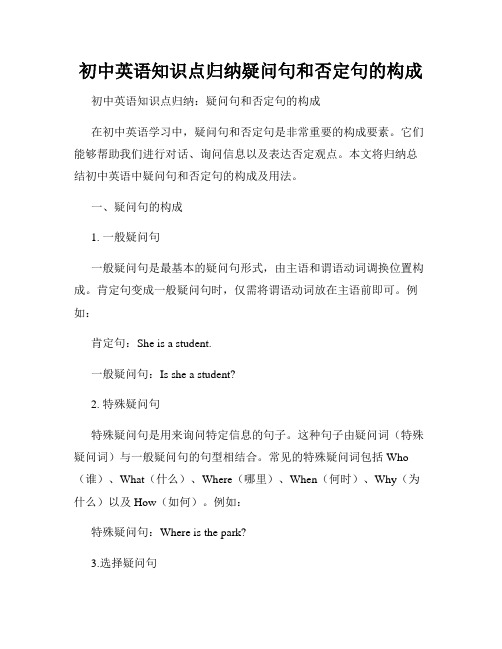
初中英语知识点归纳疑问句和否定句的构成初中英语知识点归纳:疑问句和否定句的构成在初中英语学习中,疑问句和否定句是非常重要的构成要素。
它们能够帮助我们进行对话、询问信息以及表达否定观点。
本文将归纳总结初中英语中疑问句和否定句的构成及用法。
一、疑问句的构成1. 一般疑问句一般疑问句是最基本的疑问句形式,由主语和谓语动词调换位置构成。
肯定句变成一般疑问句时,仅需将谓语动词放在主语前即可。
例如:肯定句:She is a student.一般疑问句:Is she a student?2. 特殊疑问句特殊疑问句是用来询问特定信息的句子。
这种句子由疑问词(特殊疑问词)与一般疑问句的句型相结合。
常见的特殊疑问词包括Who (谁)、What(什么)、Where(哪里)、When(何时)、Why(为什么)以及How(如何)。
例如:特殊疑问句:Where is the park?3.选择疑问句选择疑问句用于在两个或多个选项之间作出选择。
句子结构为:特殊疑问词 + or + 句子主语 + 助动词 + 其他成分。
例如:选择疑问句:Do you want tea or coffee?二、否定句的构成1. 否定句否定句是指表示否定意义的句子。
在构成否定句时,需要在谓语动词前加上否定副词(如not)或其他否定词。
例如:肯定句:He is a doctor.否定句:He is not a doctor. 或 He isn't a doctor.2. 否定疑问句否定疑问句结合了否定句和一般疑问句的特点,用于问是否属实。
构成方式为:否定词 + 主语 + 谓语 + 其他成分。
例如:否定疑问句:Isn't he a doctor?三、疑问句和否定句的用法1. 询问事实及更多信息通过疑问句,我们可以询问关于某人、某物、某地等方面的基本事实或更多信息。
例如:What is your name?(你叫什么名字?)Where do you live?(你住在哪里?)2. 表达建议或征求意见疑问句还可以用于表达建议或征求意见。
- 1、下载文档前请自行甄别文档内容的完整性,平台不提供额外的编辑、内容补充、找答案等附加服务。
- 2、"仅部分预览"的文档,不可在线预览部分如存在完整性等问题,可反馈申请退款(可完整预览的文档不适用该条件!)。
- 3、如文档侵犯您的权益,请联系客服反馈,我们会尽快为您处理(人工客服工作时间:9:00-18:30)。
选择疑问句句型归纳
选择疑问句句型归纳
【句型一】一般疑问句+ 一个供选择的对象+ or + 另一个供选择的对象?
Are you from America or Australia? 你是来自美国还是澳大利亚?
Will you give us a talk, or Jim? 是你给我们做演讲,还是吉姆?
【说明】这种选择疑问句形式上与一般疑问句相似,但内容上却与特殊疑问句相似,因此,不能用yes 或no 回答,而应在所提供的选项中选择其一作具体回答。
如
—Shall we play basketball or football? 我们打篮球还是踢足球?
—Play football. 踢足球。
【句型二】特殊疑问句+ 一个供选择的对象+ or + 另一个供选择的对象?
Which do you prefer, tea or milk? 你喜欢喝茶还是喝牛奶?
When will you set off, today or tomorrow? 你何时出发,今天还是明天?
Who teaches you English, Miss Li or Miss Wang? 谁教你们英语,是李老师还是王老师?
【说明】本句型中的特殊疑问句和两个供选择的对象要用逗号隔开。
